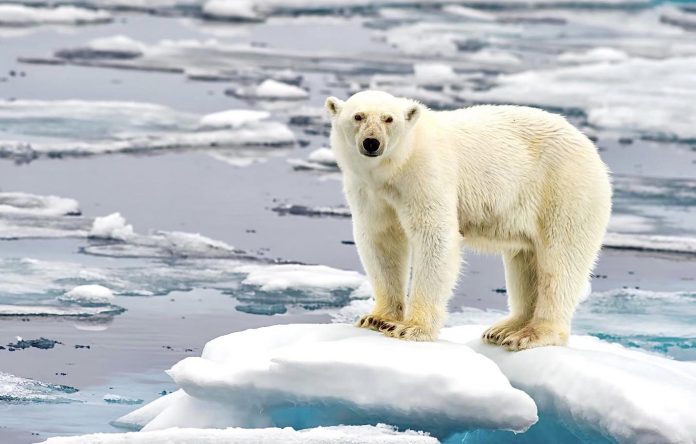Scientists are observing changes in the Earth’s climate in every region, according to the latest report by Intergovernmental Panel on Climate Change (IPCC), which was released today. Many of the changes observed are unprecedented. One example is the melting of sea ice which is putting critical species at risk of extinction.
However, strong and sustained reductions in emissions of carbon dioxide (CO2) and other greenhouse gases would limit climate change. While benefits for air quality would come quickly, it could take 20-30 years for global temperatures to stabilize, according to the IPCC Working Group I report, Climate Change 2021: The Physical Science Basis.
“This report reflects extraordinary efforts under exceptional circumstances,” Hoesung Lee, Chair of the IPCC, said in a statement. “The innovations in this report, and advances in climate science that it reflects, provide an invaluable input into climate negotiations and decision-making.”
The report provides new estimates of the chances of crossing the global warming level of 1.5°C in the coming decades, and finds that unless there are immediate, rapid, and large-scale reductions in greenhouse gas emissions, limiting warming to 1.5°C or 2°C will be beyond reach.
The report shows that emissions of greenhouse gases from human activities are responsible for approximately 1.1°C of warming since 1850-1900, and finds that averaged over the next 20 years, global temperatures are expected to reach or exceed 1.5°C warming. This assessment is based on improved observational datasets to assess historical warming, as well progress in scientific understanding of the response of the climate system to human-caused greenhouse gas emissions.
“This report is a reality check,” noted IPCC Working Group I Co-Chair Valérie Masson-Delmotte. “We now have a much clearer picture of the past, present, and future climate, which is essential for understanding where we are headed, what can be done, and how we can prepare.”
Many characteristics of climate change directly depend on the level of global warming, but what people experience is often very different to the global average. For example, warming over land is larger than the global average, and it is more than twice as high in the Arctic.
“Climate change is already affecting every region on Earth, in multiple ways. The changes we experience will increase with additional warming,” stated IPCC Working Group, Co-Chair Panmao Zhai.
The report projects that in the coming decades, climate change will increase in all regions. For 1.5°C of global warming, there will be increasing heat waves, longer warm seasons, and shorter cold seasons. At 2°C of global warming, heat extremes would more often reach critical tolerance thresholds for agriculture and health.
Human actions still have the potential to determine the future course of climate. The evidence is clear that carbon dioxide (CO2) is the main driver of climate change, even as other greenhouse gases and air pollutants also affect the climate.
“Stabilizing the climate will require strong, rapid, and sustained reductions in greenhouse gas emissions, and reaching net zero CO2 emissions. Limiting other greenhouse gases and air pollutants, especially methane, could have benefits both for health and the climate,” concluded Zhai.
Climate change is also bringing about changes in different regions, which will all increase with further warming. These include changes to wetness and dryness, to winds, snow and ice, as well as coastal areas and oceans. For example:
-
Climate change is intensifying the water cycle. This brings more intense rainfall and associated flooding, as well as more intense drought in many regions.
-
Climate change is affecting rainfall patterns. In high latitudes, precipitation is likely to increase, while it is projected to decrease over large parts of the subtropics. Changes to monsoon precipitation are expected, which will vary by region.
-
Coastal areas will experience continued sea level rise throughout the 21st century, contributing to more frequent and severe coastal flooding in low-lying areas and coastal erosion. Extreme sea level events that previously occurred once in 100 years could happen every year by the end of this century.
-
Further warming will amplify permafrost thawing, and the loss of seasonal snow cover, melting of glaciers and ice sheets, and loss of summer Arctic sea ice.
-
Changes to the ocean, including warming, more frequent marine heatwaves, ocean acidification, and reduced oxygen levels have been clearly linked to human influence. These changes affect both ocean ecosystems and the people that rely on them, and they will continue throughout at least the rest of this century.
-
For cities, some aspects of climate change may be amplified, including heat, since urban areas are usually warmer than their surroundings, flooding from heavy precipitation events and sea level rise in coastal areas.
-
For the first time, the Sixth Assessment Report provides a more detailed regional assessment of climate change, including a focus on useful information that can inform risk assessment, adaptation, and other decision-making, and a new framework that helps translate physical changes in the climate – heat, cold, rain, drought, snow, wind, coastal flooding, and more – into what they mean for society and ecosystems.



